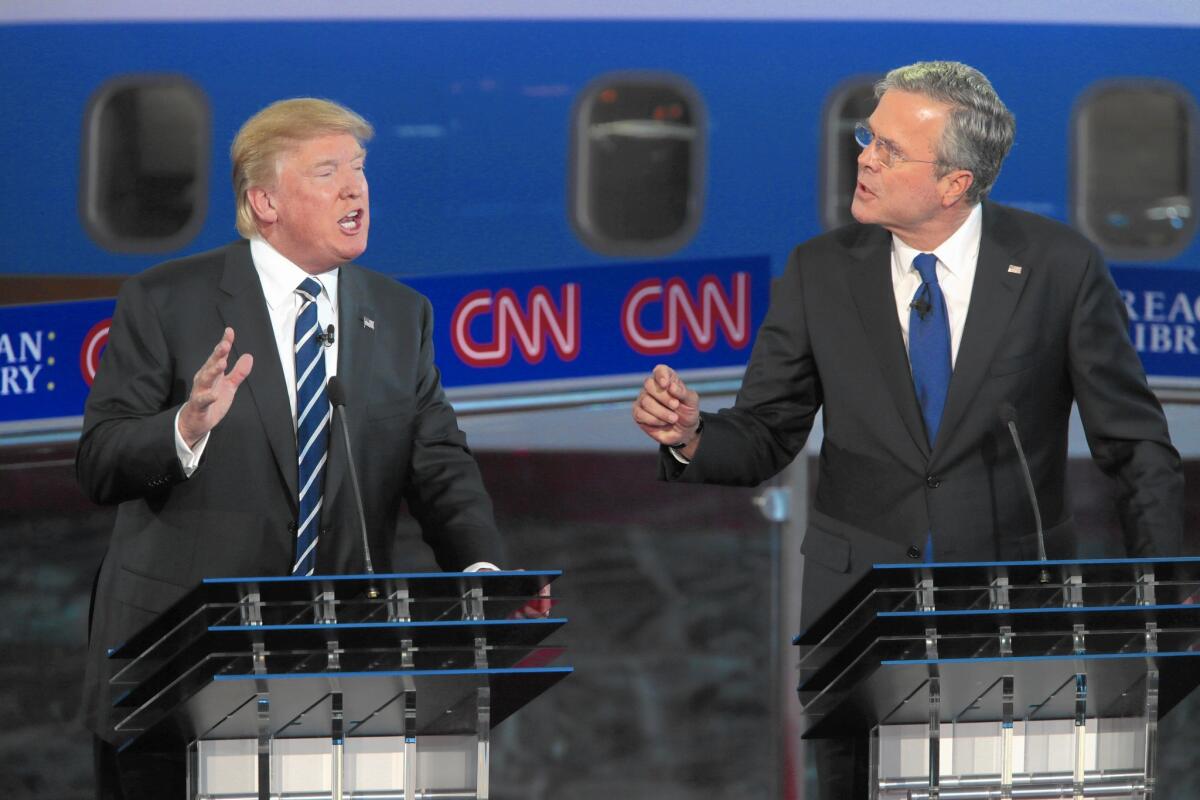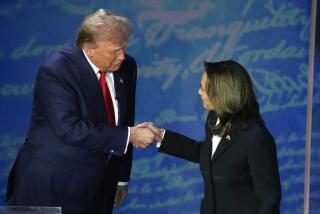Presidential debates have become must-watch television

Republican presidential candidates Donald Trump and Jeb Bush spar in the GOP debate at the Reagan Presidential Library in September.
- Share via
The surprise breakout hit of this television season isn’t some Kardashian spinoff or another cheesy competition among aspiring songsters.
It’s the prime-time presidential debates, which have attracted huge national audiences and shaped and reshaped the 2016 race long before the calendar turns, or any real votes have been cast.
Much of that can be credited to Republican Donald Trump, a singular personality when it comes to getting noticed, and to Bernie Sanders, the charismatically cantankerous Vermont senator, who is Hillary Rodham Clinton’s chief Democratic rival and the year’s other political phenomenon.
In a sense, the two are cast members, along with the rest of the presidential candidates, in a wonky form of reality TV. “We can’t wait to see who’s going to do what onstage, and how they respond to one another,” said Marty Kaplan, a former Democratic campaign strategist who teaches in the communications school at USC.
The next installment comes Wednesday, when Republicans hold their third face-to-face meeting at the University of Colorado in Boulder. The field will be divided once more, based on opinion polling, between 10 contestants sharing the main stage and four also-rans serving as their warmup act.
There are, of course, substantive reasons for voters to tune in. Amid the scripted sound bites and pre-rehearsed zingers, candidates do reveal pieces of their personalities, offer their political philosophies and even answer specific questions about issues and what they would hope to achieve in the Oval Office.
Kathleen Hall Jamieson, a University of Pennsylvania expert on political communication, notes that debate viewership traditionally rises in economically anxious times like these, especially when a race is perceived to be as competitive as the wide-open 2016 contest. “Just because it’s entertaining doesn’t mean you’re not going to learn things,” Jamieson said.
Presidential primary debates used to be the province of high-minded civic types, playing to an audience of campaign insiders and other political obsessives watching from a handful of early-voting states. There were plenty of memorable and politically significant moments.
NEWSLETTER: Get the day’s top headlines from Times Editor Davan Maharaj >>
In 1980, Ronald Reagan assumed command of the GOP race by taking control of a New Hampshire debate after the moderator tried shutting him down in a dispute over who was allowed to participate. “I am paying for this microphone!” Reagan, who financed the session, famously bellowed.
In 1984, Democrat Walter Mondale deflated Gary Hart’s “new ideas” campaign by seizing on a fast-food slogan, demanding, “Where’s the beef?”
But it is only in recent campaigns that debates have played such a major role sorting the field at such an early stage, overriding the influence of big donors and the political establishment by elevating the likes of Ben Carson — and Michele Bachmann and Herman Cain in 2012 — and diminishing favorites such as Scott Walker and Florida ex-Gov. Jeb Bush.
Carson, a former neurosurgeon with no campaign experience, surged to the fore of the GOP field after a well-regarded performance in his first debate and now leads the race in Iowa, the first state to vote next year.
Wisconsin Gov. Walker, who once topped the polls in Iowa and was considered a front-runner nationally for the Republican nomination, dropped out after largely sleepwalking through his two times onstage.
On the Democratic side, former Sens. Jim Webb of Virginia and Lincoln Chafee of Rhode Island dropped out last week after their widely panned performances in the party’s Oct.13 debate.
It is arguable whether the skills of a good debater are required to be a good president. But there is no doubt that they are more important than ever for anyone hoping to win the White House.
“You’ve got so many millions of people watching and so many instantaneous evaluations of their performance, any candidate that doesn’t measure up, it gets magnified in a way that wasn’t true before,” said Alan Schroeder, a journalism professor at Northeastern University who wrote a book covering half a century of presidential debate history.
The nature of primary debates, and the audience they attract, started changing when the cable TV networks took over. Instead of the Nashua Telegraph hosting the contestants in a high school gym, and a candidate footing the bill the way Reagan did, the debates turned into nationally broadcast spectacles — and much-hyped branding opportunities — featuring celebrity journalists roaming razzle-dazzle soundstages.
When it comes to grabbing voters’ attention, nothing else comes close.
Fox News attracted 24 million viewers for the first Republican session in August — three times the expected audience — making it the most-watched presidential primary debate in history. The second GOP debate on CNN drew nearly 23 million viewers, and the Democrats’ first debate, also on CNN, drew an audience of more than 15 million viewers.
From the candidates’ perspective, must-watch TV has turned the debates into must-be-there events.
In today’s fragmented media environment, no presidential hopeful can afford to pass up a chance to address such a massive audience, even if it means precious time away from fundraising and one-on-one campaigning in Iowa, New Hampshire and other crucial early-voting states.
“Campaigns need to stimulate interest and create demand,” said Kevin Madden, a Republican communications strategist who worked on both of Mitt Romney’s presidential races. “If you give away that opportunity, somebody else will take it and run with it.”
mark.barabak@latimes.com
Twitter: @markzbarabak
MORE POLITICAL COVERAGE
Joe Biden: Grief kept me from making earlier decision on whether to run for president
In Iowa, Hillary Clinton tries to build on her good run with jabs at Republicans
Justice Dept. won’t file criminal charges over allegations of IRS targeting conservative groups
More to Read
Get the L.A. Times Politics newsletter
Deeply reported insights into legislation, politics and policy from Sacramento, Washington and beyond. In your inbox twice per week.
You may occasionally receive promotional content from the Los Angeles Times.











